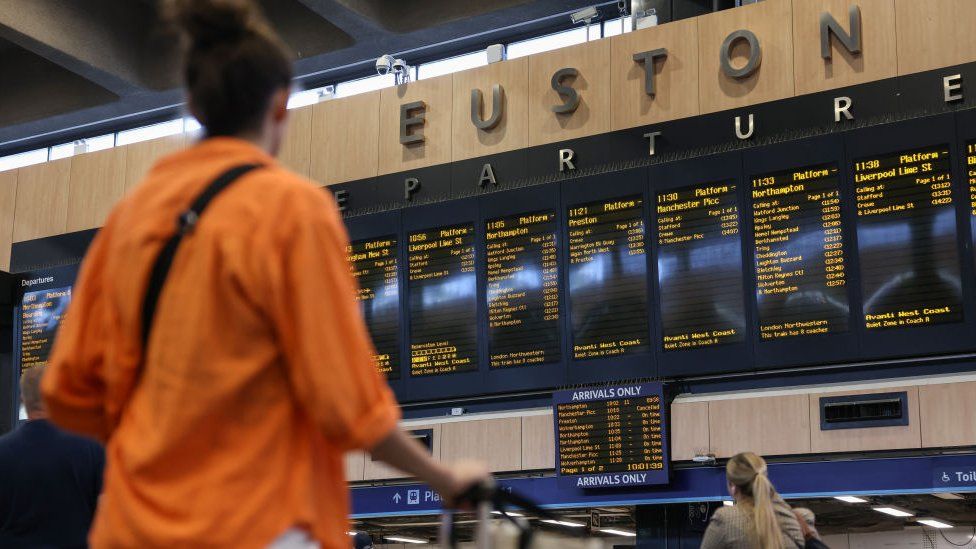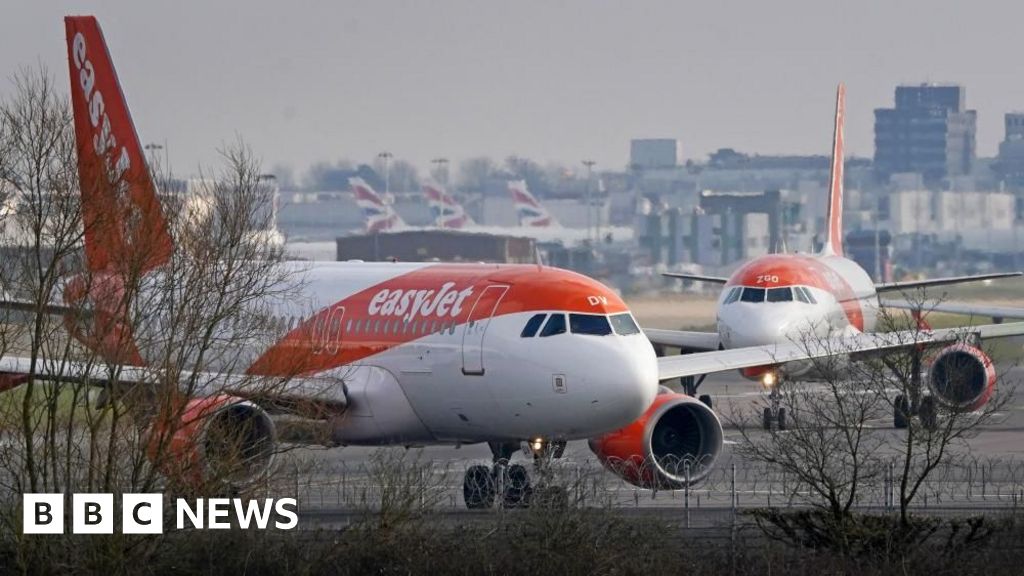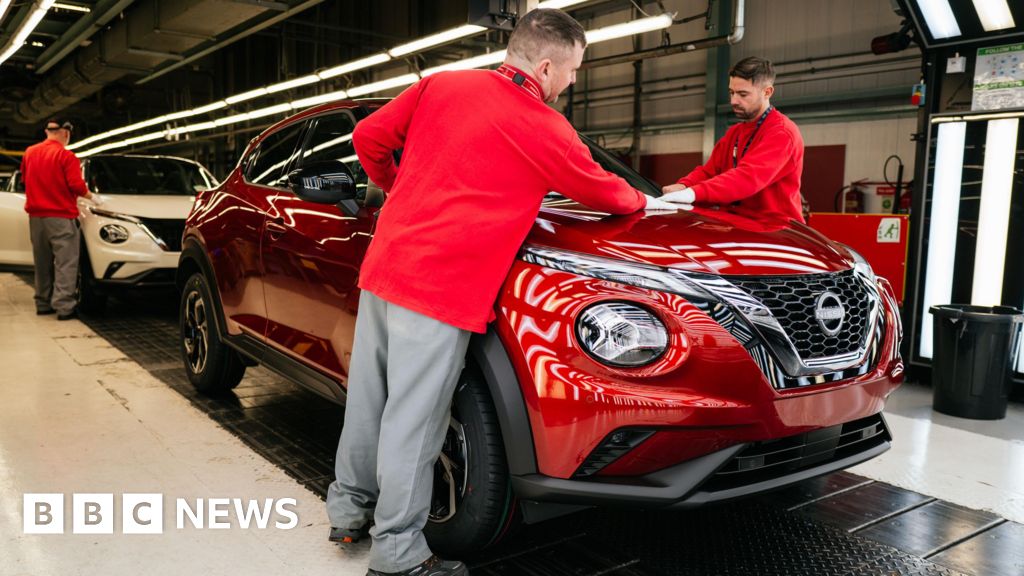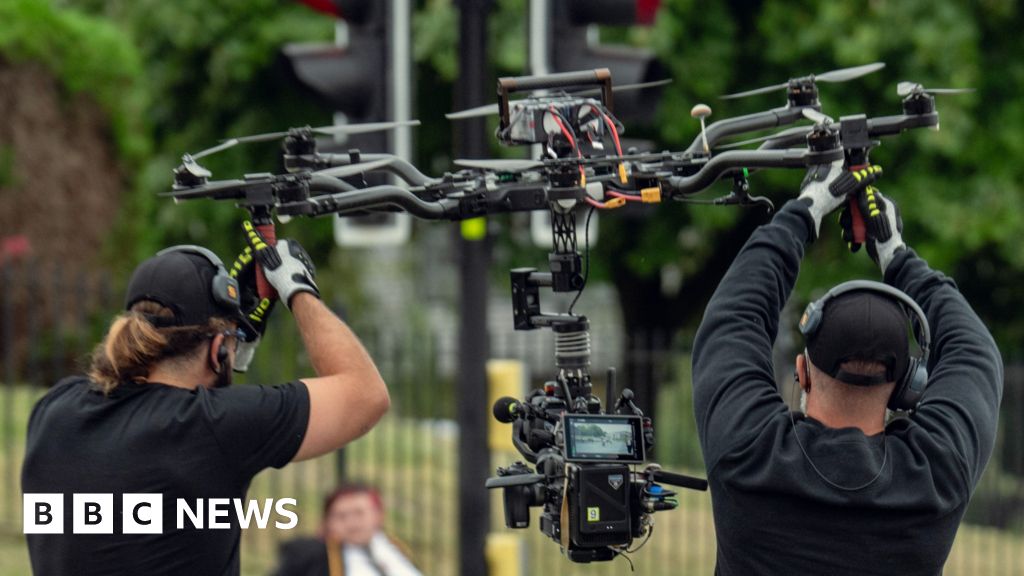ARTICLE AD BOX
By Beth Timmins
Business reporter, BBC News
 Image source, Getty Images
Image source, Getty Images
Train passengers are facing more disruption, with only 20% of services running due to strike action.
Half of Britain's lines will close on Thursday and Saturday, as more than 45,000 rail workers walk out in a dispute over pay and terms.
Some places will have no services, and where they are operating, trains will only run between 07:30 and 18:30 BST on both strike days.
Passengers are being told only to travel by train if necessary.
It is the latest in a series of summer strikes and will alter the travel plans of workers, festival goers and those heading to the cricket Test match at Lords in London.
A total of around 4,300 services will run across the country on Thursday and Saturday, according to Network Rail. This is the highest number yet during the series of national RMT union strikes.
However, it is still only just over 20% of usual service levels.
Some places, including Portsmouth, Swansea and Blackpool will have no trains at all and there will be no services running north of Falkirk.
Services will also finish earlier. For example the last train from London to Edinburgh on Thursday will leave at 14:00, while the last train to Leeds will leave at 15:05.
Trains will also start later than usual on the days following strikes.
The involvement of Network Rail signal workers across England, Wales and Scotland makes the RMT strike particularly disruptive.
It is not possible to run trains without signallers, and only a fraction can run with the available contingency staffing.
If customers are not able to travel on Thursday or Saturday, the Rail Delivery Group said they can use these tickets either the day before or up to and including 23 August. Otherwise customers will be able to change the ticket or claim a refund.
Thursday's strikes involve members of the RMT union at 14 train operators, TSSA members at seven companies and Unite members at Network Rail.
Meanwhile, on Friday both the London Underground and Overground will be affected by RMT strike action, in a separate dispute over pensions and pay.
Transport for London (TfL) says people should avoid the Tube, which will have little or no services running, and only use the rest of the network if essential.
Some bus services will also be affected as drivers take part in a strike called by the Unite union.
The summer of train disruption continues.
Today is the start of four days of reduced services in a row, because strike day disruption spills over into later-starting trains the next day.
The rail industry says these national-scale strikes cost them up to 30 million pounds a day.
And three weeks on from the previous national-scale RMT strike, resolutions to the ongoing disputes don't appear much closer.
One cohort of managers who are in the TSSA have come to an agreement with Network Rail - but other groups in the union haven't reached deals with their employers.
Last month the RMT rejected Network's Rail's latest pay offer - despite their insistence that the union should put it to their members first.
Talks since then haven't produced an agreement to prevent these latest walkouts going ahead.
When it comes to the train companies, even less progress has been made.
Unions have repeatedly accused the government of not enabling effective negotiations, but the Transport Secretary has insisted only employers and unions can settle their disputes.
'I've had to book a hotel'
Lucy Westwood has spent an extra £100 on a hotel and petrol to be able to take her children to the theatre on Thursday.
Her original plan had been to get the train from Litchfield to London to see Back to the Future. She had bought value theatre tickets for the August "Kids Week" where children get lower priced tickets.
"I'd got a day family return - all sorted and planned but then heard about the strikes," Lucy said.
She was unable get a refund from the theatre and was offered to swap her tickets but could not afford to pay the difference for a more expensive date.
Instead, she is planning to drive and has booked a hotel on the outskirts of London to break up the journey home.
"It's made things a lot more difficult, I was stuck with tickets I couldn't get a refund for and two very disappointed kids," she said.
"It's the highlight of our week but its costing me a lot more than it would of to get the train which is really frustrating."
Lucy Westwood has spent £100 extra to book a hotel for a theatre trip
Mick Lynch, general secretary of the RMT union, said members wanted to protect their pensions and secure a fair pay rise.
He said Network Rail and the train operating companies had "not made any improvement" on their previous pay offer.
Steve Montgomery, chairman of the Rail Delivery Group, which represents train companies, said: "The railway is vital to this country, but with passenger revenue still 20% below 2019 levels, securing a strong future means we have to change and move with the times.
"Only then can we fund the pay rise we want to give our people, while delivering the more reliable Sunday services and improved punctuality our passengers deserve."
Transport Secretary Grant Shapps said it was "clear" unions were "hell-bent on causing as much misery as possible to the very same taxpayers who stumped up £600 per household to ensure not a single rail worker lost their job during the pandemic".
Which train companies are affected by Thursday's strikes?
- Avanti West Coast
- C2C
- Chiltern Railways
- Cross Country Trains
- East Midlands Railway
- Gatwick Express
- Great Western Railway
- Greater Anglia
- LNER
- Northern Trains
- Southeastern
- South Western Railway
- Southern
- Thameslink
- West Midlands Trains
- TransPennine Express

 2 years ago
66
2 years ago
66








 English (US) ·
English (US) ·